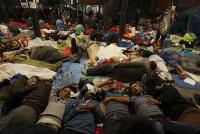-
Major reorganization at CBP: Two new offices created
U.S. Customs and Border Protection (CBP) has been significantly reorganized, according to a recent internal agency memo. CBP’s current four Operations Offices, however, will not be a part of the reorganization. These four offices, which employ 75 percent of CBP’s total workforce, include the Office of Field Operations, the U.S. Border Patrol, Air and Marine Operations, and the Office of International Trade. New offices in the proposed reorganization include Operations Support and Enterprise Services. The CBP reorganization comes in the wake of an unprecedented CBP scandal.
-
-
U.S. modifies Visa-Waiver program to make it more secure
The United States announced Monday that it would make changes to the Visa Waiver program in an effort to prevent terrorists who are citizens of Visa Waiver countries from easily entering the United States. The New York Times reports that the White House has admitted that the changes — which would impose higher fines for airlines which fail to verify passengers’ identities and increased information-sharing among countries — are limited, and that more sweeping changes would require Congressional action. Law enforcement and security experts say that the Visa Waiver program — which allows more than twenty million foreigners form the thirty-eight Visa Waiver countries to travel to the United States each year without being interviewed at American consulates and embassies — dwarfs the administration’s Syrian refugee plan, and poses a far greater threat to national security.
-
-
More than 500 travelers to U.S. flagged daily for “national security concerns”
U.S. Customs and Border Protection (CBP) data show that every day, hundreds of travelers going through airports, seaports, and land border crossings are flagged for “suspected national security concerns.” In 2014, the average daily number of those flagged for national security concerns was 548.
-
-
Canada limits Syrian refugee program to women, children, and families
Canada’s federal government announced its Syrian refugee plan, a central feature of which is limiting those accepted into Canada to women, children, and families only. Sources told CBC News that to address security concerns, unaccompanied men seeking asylum will not be part of the program.
-
-
Administration asks Supreme Court to uphold president’s executive action on immigration
One year ago, the administration announced a sweeping initiative to protect some five million undocumented immigrants from deportation for three years and grant them work permits. A coalition of twenty-six Republican-led states challenged the executive action, and earlier this month the challenge was upheld by the Fifth Circuit Court of Appeals. On Friday, the Obama administration formally asked the Supreme Court to uphold the president’s executive action. In a televised address to the nation, the president said: “We are and always will be a nation of immigrants.”
-
-
FBI director, DHS secretary criticize House Syrian refugee bill

FBI director James Comey said he is deeply concerned about a bill which passed the house last week which would require him and other top national security officials personally to certify that each refugee from Syria and Iraq whose application for asylum in the United States is accepted, is not a security threat. DHS secretary Jeh Johnson echoed Comey’s criticism.
-
-
Napolitano, Chertoff: it is possible to welcome Syrian refugees, protect U.S. security

Two former secretaries of the Department of Homeland Security — Janet Napolitano (2009-13) and Michael Chertoff (2005-9) — wrote to President Barack Obama Thursday, saying it is possible to welcome refugees while ensuring the safety and security of Americans. “The [vetting] process that is currently in place is thorough and robust and, so long as it is fully implemented and not diluted, it will allow us to safely admit the most vulnerable refugees while protecting the American people. Fortunately, these goals are not mutually exclusive,” the two former secretaries write.
-
-
House votes for an effective ban on Syrian refugees coming to U.S.
The House of Representatives on Thursday overwhelmingly approved a bill which slows down, if not blocks altogether, the resettlement in United States of refugees from Syria and Iraq. Breaking with their president, dozens of Democrats joined all the Republicans present to pass a bill which requires the directors of the FBI and national intelligence personally to approve the acceptance into the United States of each refugee.
-
-
Virginia mayor says WWII Japanese internment “inspires” his policies toward Syrian refugees

Roanoke, Virginia, mayor David Bowers (D) got into hot water on Wednesday when he issued a statement citing the U.S. internment of Japanese during the Second World War as an inspiration for his decision to delay assistance to Syrian refugees. Roosevelt, in the name of national security, ordered the forcible relocation of more than 100,000 Japanese immigrants and Japanese-Americans living in the United States to internment camps for more than three years. The internment is regarded as one of the most serious civil-liberties violations committed by the U.S. government.
-
-
Obama, GOP escalate dispute over Syrian refugees
The war of words between President Barack Obama and Republicans lawmakers and governors over the issue of letting Syrian refugees into the United States escalated yesterday, with the president describing the position of GOP governors who want to block the settlement o Syrian refugees in their states, and of lawmakers who want to block funds for the refugee resettlement program, as “offensive and hysterical.” House Speaker Paul Ryan announced on Tuesday that he had formed a taskforce to examine ways to block the administration’s refugee resettlement program. “This is a moment where it is better to be safe than to be sorry,” he said.
-
-
Visa Waiver program more serious threat than refugees: Senate Intel. Comm. chair
Senator Richard Burr (R-North Carolina), chairman of the Senate intelligence committee, said that terrorists who are citizens of Visa Waiver countries – and who, therefore, can travel from Europe to the United States without a visa — pose a more serious threat to U.S. security than refugees from Syria. Senator Dianne Feinstein (D-California), vice-chairman of the intelligence committee, said that around 13 million people enter the United States each year through the Visa Waiver program, but she also understands that more than 40 million stolen travel documents are on the black market in Europe.
-
-
GOP lawmakers try to block funding for Syrian refugees settlement in U.S.
Republican lawmakers in the House are drafting a bill which would block federal funding for resettling Syrian refugees in the United States until the federal government adopts a “processes to ensure that refugee and related programs are not able to be co-opted by would-be terrorists.” The draft bill also requires that the administration create a “longer-term monitoring process” to track Syrian refugees in the United States.
-
-
Growing number of states say they would not accept Syrian refugees

A growing number of states have said they would not accept Syrian refugees because of security worries in the wake of the terrorist attacks in Paris. So far, the governors of seventeen states have announced they would refuse to allow Syrian refugees to settle in their states: Alabama, Arizona, Arkansas, Florida, Georgia, Illinois, Indiana, Iowa, Louisiana, Massachusetts, Michigan, Mississippi, New Hampshire, North Carolina, Ohio, Texas, and Wisconsin.
-
-
France demands effective suspension of the Schengen open borders agreement
France will this week call for an effective suspension of the Schengen Agreement on open borders across Europe. The agreement was in 1985 in the town of Schengen in Luxembourg. It removes border checks within Europe, meaning that anyone. France will not call for a formal abrogation of the agreement, but would rather demand that all members of the Schengen Zone begin border identity checks, a move which amount to an effective suspension of the 30-year old agreement
-
-
As refugee crisis grows, Sweden introduces border checks
Until earlier this week, Sweden had an open-border policy – literally. Refugees could take the train or board a ferry to Sweden and enter the country unobstructed. Late last week, Sweden’s prime minister, Stefan Löfven, said this policy now poses a threat to national security, and on Tuesday the government, for the first time since the onset of the refugee crisis, ordered the introducing of border checks.
-
- All
- Regional
- Water
- Biometrics
- Borders/Immig
- Business
- Cybersecurity
- Detection
- Disasters
- Government
- Infrastructure
- International
- Public health
- Public Safety
- Communication interoperabillity
- Emergency services
- Emergency medical services
- Fire
- First response
- IEDs
- Law Enforcement
- Law Enforcement Technology
- Military technology
- Nonlethal weapons
- Nuclear weapons
- Personal protection equipment
- Police
- Notification /alert systems
- Situational awareness
- Weapons systems
- Sci-Tech
- Sector Reports
- Surveillance
- Transportation
Advertising & Marketing: advertise@newswirepubs.com
Editorial: editor@newswirepubs.com
General: info@newswirepubs.com
2010-2011 © News Wire Publications, LLC News Wire Publications, LLC
220 Old Country Road | Suite 200 | Mineola | New York | 11501
Permissions and Policies
Editorial: editor@newswirepubs.com
General: info@newswirepubs.com
2010-2011 © News Wire Publications, LLC News Wire Publications, LLC
220 Old Country Road | Suite 200 | Mineola | New York | 11501
Permissions and Policies
